Soprano Lucy Crowe has foxes on the brain at the moment. "I saw a dead fox on the road the other day. I hope it's not an omen, " she says. Since she is about to open the Glyndebourne festival singing the title role in Janácek's anthropomorphic masterpiece, The Cunning Little Vixen, I hope she's right too. But Crowe is not alone in her renardine obsessions. Soprano Emma Bell takes the part of the Fox, the Vixen's lover, and she adds: "I just got a text from a friend telling me they saw a fox run across a field and kill something. And there was that series about urban foxes on the telly. They're everywhere."
If you are lucky enough to get to Glyndebourne, wherever you look, you find yourself in the middle of bucolic nature (with the possible exception of the gigantic, triffid-like wind turbine that Gus Christie has had installed on a hill above his family's opera house). There's the perfection of the rose garden, the tranquillity of the lily-clad boating lake and the perambulating white clouds of the sheep in the fields. It seems like the perfect place for Janácek's operatic fantasy, which brings to life a cast of not just foxes, but dragonflies, frogs and an assortment of woodland critters, as well as a parallel world of glum, repressed, fox-murdering humans. Director Melly Still – whose first-ever opera three years ago was another Czech masterpiece, Dvorák's dark, watery fairytale Rusalka, also for Glyndebourne, even sees a connection between the South Downs and Janàcek's home town of Hukvaldy in Moravia, another landscape of hills and forests and dales.
So much for the sentimental idyll. The reality of Janácek's opera, first heard in Brno in 1924, is an unsentimental realisation of the instinctive, amoral world of the cycles of nature and the curse of humanity's consciousness of its mortality, and it's all set to music that is by turns joyful, violent, uplifting and joltingly surprising. But on the surface, this is a story with singing animals, so it ought, surely, to be a fairytale or at least a fable? Still is having none of it. "I don't see it remotely as a fairytale or even a folk tale. The animals are there to illuminate human behaviour. It's a story of human emotions, of sorrow and struggle and resistance to death, seen through the symbolism of the animals, and at the very end there's some kind of reconciliation to the idea of our own deaths."
Janácek was inspired to create the opera from the drawings by Stanislav Lolek of a vixen's adventures in the forest that appeared in a local newspaper, and the stories that Rudolf Tesnohlidek made from them. But the changes that Janácek made from this charming source material reveal what he was really trying to do.
The biggest difference is that Janácek has his Vixen die at the hands of the poacher in the final act. This death of the opera's heroine is over in seconds, a couple of gun-shots and a few scant bars of musical memorial. It's the opposite of emotional indulgence, and yet Crowe says that through Janácek music, "it's as if you can sense her soul going back into the spirit of the forest. I think why it's so short is that it's saying: 'Her soul's gone now, but life goes on, nature goes on.' There's never any sentimentality in the music he writes for the Vixen, even in her love scene with the Fox."
So who does Crowe think the Vixen is? Is she singing the part as a fox, as a human – or as something else? "Melly has asked us to put all our angst as a character into the big, bushy tails we have to wear, which is pretty challenging. The Vixen is very confident, but she's got a real vulnerability to her. It's not so much the music that's difficult with this part, it's the character. It's showing that naivety as well as her assertiveness." She cites the scene with the chickens in the first act, in which the Vixen gives a satirical political seminar, but then, because she can't stand the hens' reactionary laziness, kills them all and their preening cock. "She's quite a strong lady," Crowe says. "But when it comes to love, she's vulnerable. That's why when she meets the Fox she's so overwhelmed – it's like her dreams have come true."
That scene is the heart of the opera. It's a typically compressed Janácek love scene in which the characters meet, fall in love, consummate their union and start a family, all in the space of about 15 minutes. "Yes, it doesn't take very long for them to get down the hole," as Bell says, "and it's a pretty swift pregnancy!" There's some powerful symbolism going on in this scene too, related to Janácek's own life and his unrequited passion for a woman, Kamila Stösslová, who was 37 years his junior. Janácek, in his mid-60s when he composed The Cunning Little Vixen, could live out in his opera what was impossible in real life. As Still says, "Janácek fantasised that he was the Fox, and the Vixen his Kamila. They are like an ideal couple. Their love for each is instinctive and simple, unlike the Forester and his wife in the human world. He obviously once loved her, but there's no love in their relationship now, and it's only at the end that he remembers her fondly. But the Fox and the Vixen remain happy, even though they have had seven children!"
The opera's final brief scene reveals the Forester alone in the woods, remembering his life, his love of nature, and his wife. He sees a fox-cub, one of the Vixen's daughters, and a frog, who, in a child's voice, has the last words of the show, telling the Forester that his grandpa "told me about you!" It reduces Crowe to tears each time she hears it.
"I was trying to work out why. It's Janácek questioning his own mortality, and it's really because – because we're all going to die." The circle of life, as Sir Tim Rice might have put it. "It's even more moving for me since I had a baby five months ago. That changes everything. In my scenes with the fox cubs I just feel that I know how to react as a mother rather than pretending to be one." She tells us to look out for a little fox cub at the interval, as Glyndebourne has made a miniature cub-costume for her daughter, Elsie.
But Crowe isn't sentimental about the natural world of instinct that her Vixen inhabits. "My dad told me once that he drove past a crow eating a baby rabbit that hadn't quite died, and I was like, 'You should have saved the rabbit!' But that's just life. It's brutal to us, but it's not in the animal kingdom." Instinctive, immediate, tender and brutal, too: Janácek's opera is a force of nature in its own right.
Members of Guardian Extra can save £70 on tickets to see La Cenerentola at Glyndebourne on Wednesday 23 May and Friday 1 June. The ticket price includes a programme.
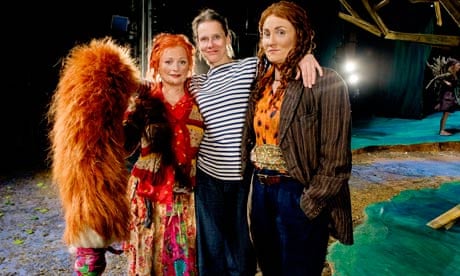

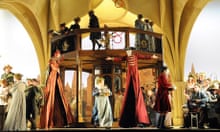
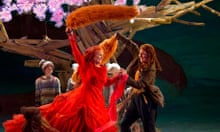
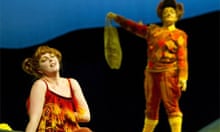
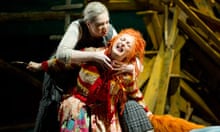
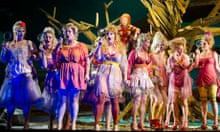

Comments (…)
Sign in or create your Guardian account to join the discussion